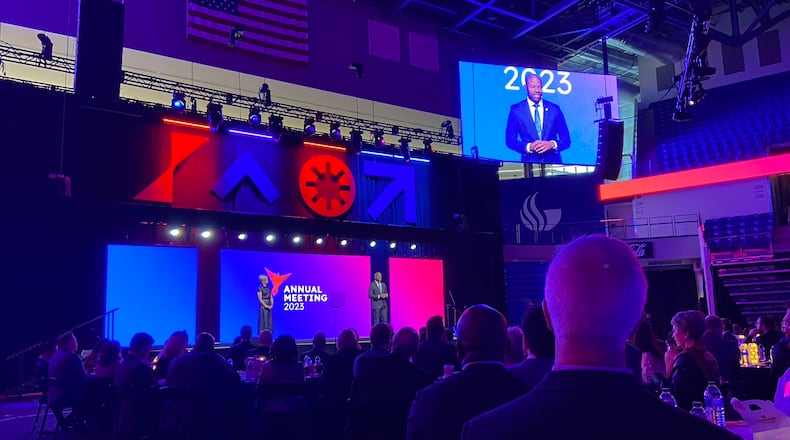The Metro Atlanta Chamber is sharpening its pitch to young workers across the country to consider a career in the Peach State, aiming to bolster a workforce pipeline that needs to grow to meet an influx of high-tech jobs.
The chamber held its 164th annual meeting Thursday at the Georgia State University Convocation Center south of downtown Atlanta, where the region’s business leaders gathered to focus on workforce development and staffing. The staffing needs are not only for fast-growing industries like clean energy and electric vehicles, but also for established corporate giants.
Chamber CEO Katie Kirkpatrick announced a 2024 campaign called “Where You Belong,” aiming to sell metro Atlanta’s businesses to ambitious young talent.
“We know the in-migration is coming here, so we want to make sure that Atlanta is that place of choice,” she said. “And the best way to do that is to tell the stories of our companies.”
Metro Atlanta’s population growth has shown no signs of slowing down. The region added 66,730 residents between April 2022 and April 2023, boosting the 11-county metro’s population to a record 5.16 million, according to estimates from the Atlanta Regional Commission. The chamber, which acts as the civic and business voice of the region’s corporate interests, oversees 29 counties in the Atlanta area.
The chamber is aiming to help Atlanta area businesses capitalize on the region’s momentum by partnering with the state’s education systems. The “Where You Belong” initiative, along with multiple internship programs and targeted workforce development programs, build upon the chamber’s revamped strategic plan to focus on emerging industries, workforce development and green energy.
“Why do we need talent? Because we’re growing. We need workers,” said Southern Company President and CEO Chris Womack, who is also the chamber’s chair for 2024. “How do we continue to make Atlanta appealing? More diverse talent.”
Credit: J. Scott Trubey
Credit: J. Scott Trubey
Kirkpatrick said Georgia’s private sector has added 280,000 jobs over the past four years, many of which are in the state’s burgeoning electric vehicle and green energy industries. Lumped under the name “Clean Tech,” the chamber has a division focused on preparing workers for jobs in those fast-changing industries. This involves collecting feedback from companies making large investments in Georgia, such as SK Battery, Hyundai and Rivian, to see what they need from their future employees.
Gov. Brian Kemp was among Thursday’s speakers, touting the state’s economic development accomplishments under his watch. He said the Peach State has continued to experience near-historic low unemployment rates and new job openings despite “economic headwinds caused by Washington D.C.’s failures,” among a few swipes at President Joe Biden’s administration.
Georgia, meanwhile, has seen a surge from green tech companies that are expanding in the U.S. in large part because of federal subsidies and other incentives backed by the Biden administration designed to promote clean energy, battery production and EVs.
Credit: Zachary Hansen
Credit: Zachary Hansen
Kemp also called for Atlanta’s business community to support the $90 million Atlanta police and firefighter training center, which was subject to multiple coordinated attempts this week to block the complex’s construction in DeKalb County.
“No matter how great our incentives are, no matter how strong our workforce is, no business or entrepreneur wants to move to a state that is unsafe,” Kemp said. “… We must support the Atlanta Public Safety Training Center.”
Kirkpatrick was in lockstep with Kemp, saying the training center — which opponents derisively call “Cop City” — has the chamber’s full support.
Georgia is expected to regain the spotlight next year during the 2024 elections and two years later as a host city for the 2026 World Cup. Kirkpatrick said the chamber will have to “stay the course” to keep the state’s business growth on track amid all the worldwide attention.
Downtown Atlanta’s development is also gaining renewed focus, because millions of soccer fans are expected to flood downtown in 2026.
The city center has been undergoing a lengthy revitalization campaign across multiple megaprojects, including CIM Group’s $5 billion Centennial Yards district that aims to reimagine 50 acres of parking lots and train tracks near Mercedes-Benz Stadium. But other projects have struggled to overcome high interest rates and a tight-pursed financing market. Under new ownership, Underground Atlanta’s plans to add residences has stalled, and the core pieces of German developer Newport’s South Downtown portfolio are slated for foreclosure.
But the chamber’s leaders said they remain optimistic about downtown’s fortunes and potential, especially with Georgia State University and the Atlanta University Center’s suite of historically Black colleges and universities as anchors for the area.
“There’s an incredible vision and opportunity to develop something tremendous down there that aligns with everything else that’s going on around this town,” Womack said. “This is hope. This is opportunity. This is aspiration. There are great things to come.”
About the Author
Keep Reading
The Latest
Featured






